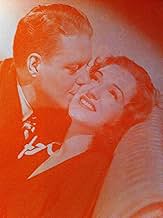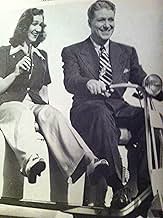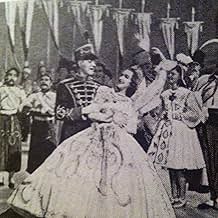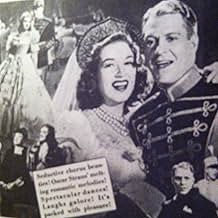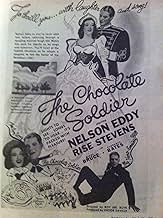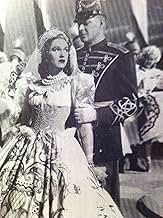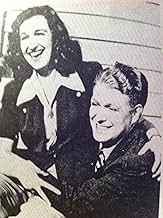Maria and Karl Lang are the singing duo of Vienna. Maria is very flirtatious and Karl very jealous. Karl decides to masquerade as a Russian guardsman and attempts to make Maria flirt with hi... Read allMaria and Karl Lang are the singing duo of Vienna. Maria is very flirtatious and Karl very jealous. Karl decides to masquerade as a Russian guardsman and attempts to make Maria flirt with him - to test her loyalty to him. As the Russian, Karl makes a vigorous attempt to seduce Ma... Read allMaria and Karl Lang are the singing duo of Vienna. Maria is very flirtatious and Karl very jealous. Karl decides to masquerade as a Russian guardsman and attempts to make Maria flirt with him - to test her loyalty to him. As the Russian, Karl makes a vigorous attempt to seduce Maria. For a moment she accepts then rejects him. Karl is left in turmoil.
- Nominated for 3 Oscars
- 3 wins & 3 nominations total
- Magda
- (as Dorothy Gilmore)
- Undetermined Secondary Role
- (uncredited)
- Singer - 'Seek the Spy' Sequence
- (uncredited)
- Emile, Voice Coach
- (uncredited)
- Waiter at the Double Eagle
- (uncredited)
- Messenger with Note
- (uncredited)
- Performer in Gypsy Café Sequence
- (uncredited)
- Stage Manager
- (uncredited)
- Flute Player
- (uncredited)
Featured reviews
It takes a long time, but the music is beautiful, including "My Hero," "Mon coeur" from Samson and Delilah, "Evening Star" from Tannhauser (in English - I'm guessing in 1941, no one wanted to hear German), and many others. A friend of mine worked for Stevens, and she would occasionally comment that she was quite a looker in her day, to which my friend would reply, "Yeah, Miss Stevens, you were all right." She was a little more than that, at a time when opera singers who had true glamor was rarer than it is today.
Eddy and MacDonald were reteamed for one more film; the world had changed too much for their operatic fantasies. When Mario Lanza starred in films that used opera ten years later, he played, among other things, a truck driver and a soldier. It's too bad; Stevens and Eddy and MacDonald and Eddy both made beautiful teams.
Dreadful choreography in the musical numbers, but beautiful Oscar Strauss music performed masterfully by Eddy and Rise Stevens, plus `Evening Star' from TANNHAUSER sung gorgeously by Eddy and `My Heart at Thy Sweet Voice' from SAMSON AND DELILAH by Stevens. Even though Stevens has the superior voice, one can't help wishing that Jeanette MacDonald, with her considerable comic gifts, had been available for the part!
The history of the original operetta is fairly well known: Straus wanted to adapt one of G.B. Shaw's earliest and arguably funniest plays, ARMS AND THE MAN to the operetta stage. Shaw was amenable but doubted the result would work and didn't want to undercut the ongoing royalty stream of one of his most successful plays (it is regularly performed to this day).
In compromise, Shaw demanded a number of conditions: 1) they WOULD use his basic plot (in fact the authors and Stanislaus Strange in his English language translation shoehorned most of Shaw's interpersonal comedy into the first and third acts of their operetta but omitted almost entirely the Fabian class comedy Shaw held dear to his heart), 2) they would not use any of the original character names or a single actual LINE of his dialogue, 3) all programs for productions in England had to carry the producers apologies to Shaw "for this unauthorized PARODY of one of his plays." 4) In return for these concessions, Shaw would decline ANY royalties for the operetta (but reserved the right to hate the result - which he did - probably at least in part as a result of the fortune he had declined on principle). Straus and company happily accepted the deal.
As Shaw expected, the operetta left out most of his best and funniest ideas; to his great surprise, it retained ENOUGH and had music GOOD enough that it was an enormous success anyway.
In 1940, when MGM wanted to continue their series of successful operetta films with Nelson Eddy, they found they had to approach the still very active Shaw - who had won an Oscar for Best Screenplay just two years before for his adaptation of his own play, PYGMALION. The great man was willing to be persuaded but unenthusiastic. He really didn't like the bowdlerization of one of his best perennial plays.
MGM had hoped/expected to snap up the rights to the old show on the cheap, but Shaw was not to be shortchanged. No deal could be struck on terms as cheap as MGM wanted. Still, MGM HAD the rights to the music and lyrics and the famous title so they went ahead anyway.
Technically they used Molnar's play THE GUARDSMAN as the basis for their film (it's really a generic but funny "jealous husband tests wife's fidelity with a masquerade she sees through" tale that's as old as the hills and Lubitch did it better in the 30's), but they didn't bother trying to adapt it to the old score.
Instead, they justified the TITLE and score they had bought by having the leads fairly obviously performing the operetta on stage between the off-stage comedy scenes (the credits in the opening "crawl" are among the most bizarre you will see anywhere). They just didn't show the plot scenes from the operetta and near the end rather outrageously had Eddy's character play the Second Act Finale from the operetta on the Act I set and in a brand new costume to make an offstage point - as if the audience in the theatre in the film wouldn't notice (watch the reactions of the delightful Nigel Bruce, tossed in as the befuddled best friend/observer).
MGM might as well have done DIE FLEDERMAUS for the same basic story and even better music, but what they got was and remains good fun - and Eddy wasn't ever up to a ...FLEDERMAUS in vocal or acting ability. Risë Stevens, a more down to earth actress than the bubbly MacDonald who usually left Eddy in the dust (and with a singing voice every bit as good), proved to be a solid, believable acting partner for him and (together with a relatively solid comedy book) makes Eddy seem to give one of his best performances on screen.
It's our loss that the declining popularity of Eddy and the quality of his vehicles deprived us of more pairings with Stevens who was so perfect for him. MacDonald was back for I MARRIED AN ANGEL (1942), he really didn't have a leading lady for the Claude Rains PHANTOM OF THE OPERA (1943) or KNICKERBOCKER HOLIDAY (1944) and then, except for NORTHWEST OUTPOST (1947), it was all but over.
Now that both are in the public domain, it would be wonderful to get actual movies of ARMS AND THE MAN (the original 1932 British film has not been seen in years) and the *real* CHOCOLATE SOLDIER (there was a 1915 silent film of the 1909 operetta co-directed by the American translator) with the Stanislaus Strange libretto out of Shaw, but until they are appear, this hybrid comedy with healthy glimpses of an over produced version of the original is good fun.
I will agree that the story about a man suspecting his wife of infidelity is predictable and creaks with age, and the choreography at times was disappointingly unexciting and pedestrian. But putting these flaws aside, this is a truly beautiful and entertaining film. One thing for certain, the production values were simply fabulous. The lavish costumes and beautiful sets were really a wonder to look at. The score is phenomenal, featuring some Oscar Strauss hits like My Hero, Thank the Lord the War is Over, Sympathy and of course the Chocolate Soldier, and some well known opera gems like Mon Couer s'oeuvre a Ta voix from Saint Saens's Samson and Delilah and Evening Star from Wagner's Tannhauser. While my Lady Sleeps was stunning too, but the real highlight was the enormously entertaining Song of the Flea. The performances were sublime; while the beautiful Rise Stevens is probably at her loveliest and sings beautifully, it is the wonderful undervalued Nelson Eddy who steals the show with his beautiful resonant voice and flawless comic timing and stage presence. Nigel Bruce and Florence Bates are good too.
All in all, a beautiful film. Not perfect, but the production values, score and performances make it a treat. 8/10 Bethany Cox
Did you know
- TriviaThis has interesting origins from musical and non-musical plays. In 1909, the operetta "The Chocolate Soldier" opened in New York. This was based on the non-musical play "Arms and the Man" by George Bernard Shaw. However, Shaw voiced objections to his play being adapted as an operetta. A silent film adaptation, The Chocolate Soldier (1914), based on the New York operetta, omitted any reference to George Bernard Shaw. In 1911, a Hungarian non-musical play "Testör" ("The Guardsman") by Ferenc Molnár, opened in Budapest. In 1941 when this film was made, George Bernard Shaw was still alive. Therefore, the music of the New York operetta and the plot of the Hungarian non-musical play "The Guardsman" were used.
- GoofsWhen Eddy is impersonating a Russian singer, the nightclub impresario introduces him as a bass, but then Eddy sings. He is a baritone.
- ConnectionsFeatured in We Must Have Music (1941)
- SoundtracksMy Hero
(1909) (uncredited)
Music by Oscar Straus
Musical adaptation by Bronislau Kaper and Herbert Stothart (1941)
Original lyrics by Rudolph Bernauer and Leopold Jacobson
English lyrics by Hugh Stanislaus Stange (as Stanislaus Stange)
Additional lyrics by Gus Kahn (1941)
Sung by Risë Stevens and Nelson Eddy in the show
Hummed a cappella by Florence Bates
Sung by Risë Stevens in the Gypsy Café
Reprised by Risë Stevens and Nelson Eddy in the show at the end
Details
- Runtime1 hour 42 minutes
- Color
- Aspect ratio
- 1.37 : 1
Contribute to this page


